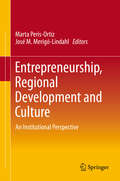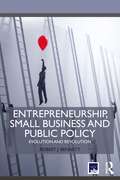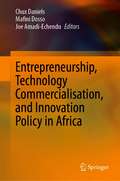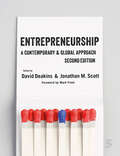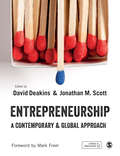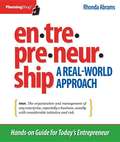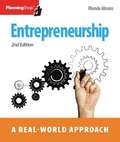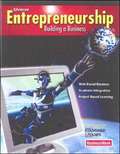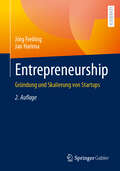- Table View
- List View
Entrepreneurship, Regional Development and Culture
by Marta Peris-Ortiz José M. Merigó-LindahlThe aim of this book is to analyze the relationships among entrepreneurship, regional development and culture in the current economy. Using an institutional approach, it examines the main theoretical issues and practices and their effect on different dimensions of society and the economy. Business creation is considered a key element of economic growth, innovation and employment. In recent years, entrepreneurial scholars have studied the factors that affect entrepreneurship and drive economic growth. In doing so, these scholars have aimed to understand what promotes entrepreneurial activity and also how to improve the development of regions or countries to increase wealth in society. The institutional approach can be applied to the entrepreneurship field to understand the phenomenon of entrepreneurship. This view considers the role of environment in the decision to create a company, which is critical to entrepreneurship, innovation and economic growth. Environment relates to legal aspects, public policy and support services (formal institutions) but is especially important in terms of sociocultural context (informal institutions). The creation of new ventures is greatly influenced by culture. Furthermore, it is important to highlight the influence of entrepreneurship on regional development, specifically through job creation, stimulation of economic growth and innovation. Thus, entrepreneurship, regional development and culture are fundamental for understanding economic growth and development as well as other phenomena such as technology transfer or women's entrepreneurship. Featuring contributions and cases studies from various countries and sectors, this volume provides an essential reference for scholars, academics, and researchers in entrepreneurship, business management, innovation and economics.
Entrepreneurship, Self-Employment and Retirement
by Natalie Sappleton Fernando LourençoEntrepreneurship, Self-Employment and Retirement presents a collection of nine studies which contribute to a more robust and richer understanding of entrepreneurship, self-employment and retirement in a diversity of settings, including the Netherlands, Canada, the United Kingdom, Singapore and the US, by drawing on both qualitative and quantitative data. By presenting these diverse accounts of pre- and post-retirement self-employment, this volume broadens and enriches existing knowledge about this distinct form of entrepreneurship, and contributes theoretically, methodologically and empirically to an embryonic yet fascinating field.
Entrepreneurship, Small Business and Public Policy: Evolution and revolution (Routledge Masters in Entrepreneurship)
by Robert J. BennettPublic policy interventions aimed at encouraging, supporting and developing small businesses are important for understanding entrepreneurship and small business management. This textbook is the first to provide teachers and students with a resource that gives an overview of how institutional and policy structures interact with small firm start-ups, continuation and succession/failures. Beginning with a brief introduction to policy processes, the text covers the main policy instruments for entrepreneurial market entry and start-up support, for on-going small business advice and financial support, and succession planning. It particularly focuses on policies that improve the Business Enabling Environment through macroeconomic policy, institutional reform, and deregulation of bureaucratic burdens. Theoretical rigour is complemented by detailed assessments of current policies around the world, including USA, advanced and emerging economies and Policy support from global institutions such as the World Bank and the ILO are included. Written by a pre-eminent scholar of public policy and entrepreneurship, this textbook provides a concise but thorough introduction to the subject for Master's students internationally. Policy recommendations in the author's conclusion also highlight the book's value to policy-makers as they adapt to the globalized, digital world.
Entrepreneurship, Sustainability and Social Responsibility: The Importance of Agenda 2030 (International Studies in Entrepreneurship #48)
by David B. Audretsch Anders Lundström Anna SörenssonThis edited collection unveils the pivotal role of entrepreneurship in realizing the 2030 Agenda for Sustainable Development. Global scholars converge to scrutinize entrepreneurship's centrality in the transformative framework endorsed by the United Nations. Encompassing nuanced examinations, the volume surveys evolving perspectives on Agenda 2030, appraises policy implications and scrutinizes entrepreneurship's potency as a change catalyst. Chapters deal with practical applications, assessing the Agenda's efficacy in nurturing local enterprises. Exploring the interplay between corporate social responsibility and entrepreneurship, the book analyzes the potential of tailoring Sustainable Development Goals to diverse contexts. Furthermore, the book critically analyzes implementation factors and prevailing research gaps in public sector integration. In sum, this compendium exemplifies Agenda 2030's role in driving multifaceted political and local metamorphoses across sectors and is useful for researchers and policymakers alike.
Entrepreneurship, Technological Change and Circular Economy for a Green Transition: Research Contributions for a More Productive Environment (Studies on Entrepreneurship, Structural Change and Industrial Dynamics)
by Luísa Cagica Carvalho Conceição Rego Adriana Backx Noronha Maria Raquel Lucas María Isabel Sánchez-HernándezThis book is a comprehensive and timely publication that aims to be an essential reference source, building on contemporary research in the fields of circular economy and green transition in relation to entrepreneurship and technological change. This book aims to address a range of approaches including, but not limited to, the conceptual, theoretical, and case studies related to the topics of the book. The topical focus is on how circular economy contributions, energy infrastructure, green transition, and digital transformation are contributing to attaining the Sustainable Development Goals (SDGs). The expert contributions in the book particularly help us learn more about the answers to the current challenges of the green transition as well as how the necessary technological change will impact, mainly, the enterprises and the field of agriculture production and agribusiness. The book is mainly intended to support an academic audience (academics, university teachers, researchers, and post-graduate students – both Master's and Doctorate levels). In addition, this book will be of benefit to institutional experts, developers, and researchers in the fields of Entrepreneurship and technological change in circular economy and green transition.
Entrepreneurship, Technology Commercialisation, and Innovation Policy in Africa
by Joe Amadi-Echendu Chux Daniels Mafini DossoThis book provides a comprehensive overview of role of entrepreneurship, technology commercialisation and innovation policy for the achievement of economic development and prosperity in African societies. It adopts a broad innovation systems approach. The book examines entrepreneurship, innovation, and technology commercialisation alongside context-specific factors associated with them. It also provides an interdisciplinary perspective, by discussing the above disciplines in a connected way. This book is presented in three distinct parts. It starts by discussing entrepreneurship and the state of the entrepreneurial ecosystem in Africa. It then moves on to present technology commercialisation in Africa, before finally discussing the future directions for entrepreneurship, technology commercialisation and innovation policy. This broad picture provided in the book enables the reader to grasp the relevant messages, whilst the detailed analysis applies world-class theories and frameworks to deepen the readers understanding of key concepts and issues examined.
Entrepreneurship: A Contemporary & Global Approach
by David Deakins Jonathan M. ScottThis popular and well received standard text on Entrepreneurship has been completely revised and updated for the second edition. The text retains the favourably reviewed features of the first edition which include the importance of context, diversity and differing international entrepreneurial practice, yet is underpinned by coverage and application of relevant theory. In particular, the text now contains important and entirely new sections on entrepreneurship in the face of multiple global crises, evidence on entrepreneurial resilience, new case study material on examples of international entrepreneurship from developing countries including a new section on Entrepreneurship in Sub-Saharan Africa, new case material on ‘clean technology’ entrepreneurship and on green finance, and a new chapter on Indigenous Entrepreneurship. All chapters have been completely updated to reflect increased diversity and the place of Entrepreneurship in the context of multiple global crises. The text retains the pedagogic features of the first edition which are consistent throughout the text and include learning outcomes, boxed case studies with discussion questions, policy and practical issues, summaries of each chapter, recommended reading and suggested assignments. The text is complemented by online support material for tutors.
Entrepreneurship: A Contemporary & Global Approach
by David Deakins Jonathan M. ScottThis popular and well received standard text on Entrepreneurship has been completely revised and updated for the second edition. The text retains the favourably reviewed features of the first edition which include the importance of context, diversity and differing international entrepreneurial practice, yet is underpinned by coverage and application of relevant theory. In particular, the text now contains important and entirely new sections on entrepreneurship in the face of multiple global crises, evidence on entrepreneurial resilience, new case study material on examples of international entrepreneurship from developing countries including a new section on Entrepreneurship in Sub-Saharan Africa, new case material on ‘clean technology’ entrepreneurship and on green finance, and a new chapter on Indigenous Entrepreneurship. All chapters have been completely updated to reflect increased diversity and the place of Entrepreneurship in the context of multiple global crises. The text retains the pedagogic features of the first edition which are consistent throughout the text and include learning outcomes, boxed case studies with discussion questions, policy and practical issues, summaries of each chapter, recommended reading and suggested assignments. The text is complemented by online support material for tutors.
Entrepreneurship: A Contemporary & Global Approach
by Professor David Deakins Dr. Jonathan M. ScottWritten by a team of leading international scholars, this new book treats entrepreneurship as an ever-evolving social phenomenon, and explores the recent trends that impact it, such as: digitisation; disruptive technologies; the rise of the 'gig' economy and; the growing importance of community-based and social entrepreneurship. Including a mixture of case studies, examples, consideration of policy issues and exercises, this text provides practical perspectives of Entrepreneurship in support of key theory, while discussion questions, suggested reading and assignments help situate and test understanding.
Entrepreneurship: A Contemporary & Global Approach
by Professor David Deakins Dr. Jonathan M. ScottWritten by a team of leading international scholars, this new book treats entrepreneurship as an ever-evolving social phenomenon, and explores the recent trends that impact it, such as: digitisation; disruptive technologies; the rise of the 'gig' economy and; the growing importance of community-based and social entrepreneurship. Including a mixture of case studies, examples, consideration of policy issues and exercises, this text provides practical perspectives of Entrepreneurship in support of key theory, while discussion questions, suggested reading and assignments help situate and test understanding.
Entrepreneurship: A Contemporary Perspective
by Adnan Ul HaqueEntrepreneurship: A Contemporary Perspective emphasizes theories and practices related to entrepreneurship as it is found in the real world. The book provides in-depth insights into entrepreneurship concepts and offers practical learning solutions through its many and varied case studies. The book explores the attributes of successful entrepreneurial ventures in a changing business environment and explains how key concepts, approaches and practices have evolved over time. The unique focus of this textbook is that it steps away from the traditional views of entrepreneurship and instead looks at entrepreneurship through a number of distinct lenses, including gender, geopolitical trends, and the social environment. The book also examines the optimal conditions and strategies for the survival and sustenance of entrepreneurial ventures in an ever-changing business world. With a future-facing focus, Entrepreneurship: A Contemporary Perspective shines a light on what entrepreneurship will be like in the next few – likely transformative – decades. Suitable for students at advanced undergraduate and postgraduate levels, this textbook will find a home wherever modern entrepreneurship is taught and studied.
Entrepreneurship: A Global Perspective (Routledge Masters in Entrepreneurship)
by Stephen RoperEntrepreneurs exist in every country but the nature and level of entrepreneurial activity differs remarkably. Why is this? What shapes the level of entrepreneurial activity in each country? What defines entrepreneurial activity? As more and more teaching and research into entrepreneurship reflects its often international nature, the need for literature reflecting this grows. This concise new textbook provides an introduction to topics in entrepreneurship in a global context; focusing on how enterprise works across the world. Important topics such as financing, innovation and (anti) social enterprise are discussed in detail throughout the text and examples and case studies are used to illustrate the application of different theoretical and conceptual approaches to entrepreneurship and the role it plays in developed, emerging and transitional economies. Entrepreneurship: A Global Perspective is suitable for both final year undergraduate and postgraduate courses in enterprise and is likely to appeal particularly to student groups with a strong international element.
Entrepreneurship: A New Perspective (Routledge Studies in Global Competition #Vol. 22)
by Thomas GrebelThe entrepreneur has been neglected over the years in formal economic theorizing. Previously there has been only eclectic theories such as human capital theory and network dynamics which discuss certain perspectives of entrepreneurial behaviour. This insightful book closes this gap in entrepreneurship literature. Inspired by modern physics, author Thomas Grebel brings together an evolutionary methodology, along the way implicating quantum, graph, and percolation theory. Here, Grebel has provided a synthesis of all the main theories of entrepreneurship. Taking an interdisciplinary approach to the subject, this fascinating book opens up new ideas in modelling and the original thinking contained within will be of interest to all those working in the area of business and management as well as those in economics.
Entrepreneurship: A Process Perspective (2nd Edition)
by Robert A. Baron Scott Andrew ShaneCurrent, comprehensive, and cutting edge, ENTREPRENEURSHIP: A PROCESS PERSPECTIVE equips potential entrepreneurs with the tools and insight for success. With solid theory and relevant examples, this thorough resource covers the entire process of building a business. Seasoned instructors and entrepreneurial authorities, Professors Baron and Shane deliver a practical, applied process approach with a multidisciplinary perspective, drawing on knowledge from the studies of economics, psychology, and other areas. The book begins with recognizing opportunity and building a team, and then moves through assembling finances, the business plan, legal issues, marketing, growth, and exit strategies. Rather than getting bogged down in excessive discussions of theory, Baron and Shane use real-world examples to illustrate how students can apply chapter concepts to their own business ventures. Thoroughly updated and revised based on student and professor feedback, the second edition adds a chapter on legal issues specific to entrepreneurs--including intellectual property considerations--and an appendix on key accounting principles entrepreneurs should know. A new chapter on growth strategies for new ventures is coupled with a chapter on managing new ventures for growth. In addition, new boxed features shed light on common myths and misperceptions about entrepreneurship. The book is also packed with hands-on applications--including a case written specifically for each chapter--giving students experience putting text concepts into real-world action.
Entrepreneurship: A Real-World Approach
by Rhonda AbramsA practical guidebook for people interested in starting a business with comprehensive coverage of all aspects of starting, running and growing a business. This book includes everything needed to launch a successful business now--expert strategies, up-to-date trends, business planning guidance, and inspiring real-world case studies, along with worksheets and critical thinking exercises to help would-be entrepreneurs be successful.
Entrepreneurship: A Real-World Approach
by Rhonda AbramsA practical guidebook for people interested in starting a business with comprehensive coverage of all aspects of starting, running and growing a business. This book includes everything needed to launch a successful business now--expert strategies, up-to-date trends, business planning guidance, and inspiring real-world case studies, along with worksheets and critical thinking exercises to help would-be entrepreneurs be successful.
Entrepreneurship: An International Introduction (New Horizons In Entrepreneurship Ser.)
by Dafna KarivEntrepreneurship means different things to different people, but the entrepreneurial personality is a critical success factor to any new business. These traits are also increasingly in great demand at established multinational corporations. This groundbreaking textbook differs from its competitors by placing an emphasis both on the core processes and practices of entrepreneurship, as well as demonstrating the impact of complex, local environments in shaping the processes of entrepreneurship. Topics include: Main processes of entrepreneurial venture creation, innovation and growth Operational steps characterizing processes of entrepreneurship Establishing and realizing entrepreneurial ventures Core processes and practices of entrepreneurship With case studies and interviews with entrepreneurs from across the globe, Entrepreneurship's international approach makes it stand out from other titles, providing students and practitioners alike with a unique perspective on this subject. A companion website featuring: a lecturer's guide, with extra assignments and links to videos, PowerPoint slides for teaching uses and a questionnaire with detailed feedback for students, is available at: http://cw.routledge.com/textbooks/9780415561204.
Entrepreneurship: Building a Business
by Earl C. Meyer Kathleen AllenGlencoe Entrepreneurship: Building a Business© 2011 teaches students the business and academic skills they need to build and manage a successful 21st century business. There is extensive coverage of successful young entrepreneurs and web-based businesses as well as traditional "brick and mortar" businesses. The development of a business plan is emphasized.
Entrepreneurship: Choice and Strategy (First Edition)
by Joshua Gans Scott Stern Erin ScottNavigating Key Choices for a Successful Venture Joshua Gans, Erin L. Scott, and Scott Stern wrote this book for students—all students—who are hungry to learn how they can emulate the success of entrepreneurs they see in the media and in their communities. This text brings modern research and insights together to teach a proven approach to understanding, navigating, and choosing an entrepreneurial path. Informed by their decades of research, the authors provide tested tools to get started, helping students use four key choices and four core strategic approaches to find and frame opportunities. Throughout, the book emphasizes that students should choose and pursue the approaches that fit their personal goals and interests, and it underscores the important roles of guidance, mentorship, and entrepreneurial education in a founder’s path to success. This purchase offers access to the digital ebook only.
Entrepreneurship: Gründung und Skalierung von Startups
by Jörg Freiling Jan HarimaLernen Sie mit diesem Buch Entrepreneurship-Modelle und gründungsrelevante Methoden am Beispiel von Startups kennenDieses sehr anwendungsorientierte Lehrbuch verknüpft auf innovative und verständliche Weise wissenschaftliche Entrepreneurship-Modelle und gründungsrelevante Methoden und Techniken mit gründungsbezogenen Erfahrungen. Die Autoren begleiten den Leser Schritt für Schritt von den ersten Grundüberlegungen bis zur unternehmerischen Selbstständigkeit über die Gründung in das laufende Geschäft. Echte Fälle und reale Personen illustrieren die unternehmerische Realität und machen es Ihnen leicht, sich in die Situation des Gründens hineinzuversetzen und sie mit der eigenen Lebensrealität zu verknüpfen.Die Autoren behandeln vielfältige Inhalte zur UnternehmensgründungIn diesem umfangreichen Buch lernen Sie sowohl die Grundlagen des Entrepreneurship als auch neue Verfahren des Gründens kennen, darunter:Design ThinkingLean StartupCanvas-ModelleDie Autoren behandeln ausführlich die einzelnen Phasen des Gründens und beschreiben detailliert und anhand von Beispielen, was in den einzelnen Phasen besonders zu beachten ist. So geht es in der Vorgründungsphase um die Themen Geschäftsidee, Geschäftsmodellierung und Pitching. Die Gründungsphase ist geprägt durch konstitutive Führungsentscheidungen, Entrepreneurial Marketing, Entrepreneurial Finance, Entrepreneurial Monitoring und schließlich den passenden Businessplan. In der Wachstumsphase wiederum, die bisher relativ wenig Beachtung gefunden hat, spielen unter anderem die Aktivierung von Wachstumstreibern sowie das Krisenmanagement eine entscheidende Rolle. Insgesamt bietet das Buch von Jörg Freiling und Jan Harima somit nicht nur Studierenden in Universitäten, Fachhochschulen und Berufsakademien, sondern auch (zukünftigen) Gründern sowie Menschen mit allgemeinem Gründungsinteresse wertvolle Informationen.
Entrepreneurship: Gründung und Skalierung von Startups
by Jörg Freiling Jan HarimaDieses sehr anwendungsorientierte Lehrbuch verknüpft auf innovative Weise wissenschaftliche Entrepreneurship-Modelle und gründungsrelevante Methoden und Techniken mit gründungsbezogenen Erfahrungen. Der Akzent wird dabei auf Startups als innovative und wachstumsorientierte Jungbetriebe gelegt. Die Autoren begleiten den Leser Schritt für Schritt von der Gründungsvorbereitung über den Gründungsprozess bis tief in die bislang eher wenig beachtete Wachstumsphase hinein.Echte Fälle und Personen illustrieren die unternehmerische Realität und erleichtern es, sich in die Situation des Gründens hineinzuversetzen und sie mit der eigenen Lebensrealität zu verknüpfen. So bietet das Lehrbuch nicht nur Studierenden, sondern auch (zukünftigen) Gründern wertvolle Informationen.Für die 2. Auflage wurde das gesamte Lehrbuch überarbeitet, ergänzt und aktualisiert. Insbesondere wurden Teil III zum Entrepreneurship in der Gründungsphase sowie Teil IV zum Entrepreneurship inder Wachstumsphase maßgeblich erweitert und umstrukturiert.
Entrepreneurship: Ideas In Action (Introduction to Business)
by Cynthia GreeneNIMAC-sourced textbook
Entrepreneurship: Ideas In Action (Second edition)
by Cynthia L. GreeneEntrepreneurship: Ideas in Action takes students through the entire process of running their own business. Creating a business plan is covered extensively and a business plan project is in every chapter. New Deca Prep features are added to help with competitive events preparation. Loaded with activities, computer applications, Internet activities, and an enhanced web site, this text will get users ready to launch their business ideas.
Entrepreneurship: Ideas in Action
by Cynthia L. GreeneENTREPRENEURSHIP: IDEAS IN ACTION takes students step-by-step through the entire process of starting and running a business. Creating a business plan is covered extensively, and a business plan project is part of every chapter. Each chapter ends with a Case Study and a BPA, DECA, or FBLA Prep to help students prepare for competitive events. Highlights of real entrepreneurs' pitfalls present the realities of entrepreneurial challenges. Loaded with activities, updated computer applications, new Internet activities, and an enhanced Web site, this text helps students launch their business ideas.
Entrepreneurship: Ideas in Action
by Cynthia L. GreeneIt's well known today that becoming a business owner is a career option. ENTREPRENEURSHIP: IDEAS IN ACTION 5E provides you with the knowledge needed to realistically evaluate your potential as a business owner. This text encourages you to examine all the major steps involved in starting a new business: Ownership, Strategy, Finance, and Marketing. As you complete the chapters, you develop a business plan and learn what it takes to get an entrepreneurial venture off to a good start. Market research, budgeting, selecting a business location, and financing the business are covered using real-life examples that you can easily relate to. Information on online research, including online business planning, is also included.
